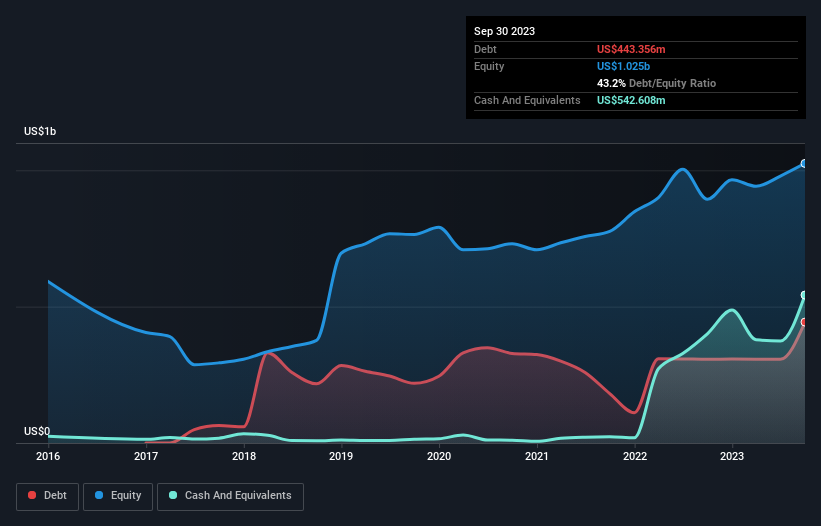- Canada
- /
- Oil and Gas
- /
- TSX:IPCO
These 4 Measures Indicate That International Petroleum (TSE:IPCO) Is Using Debt Reasonably Well
Warren Buffett famously said, 'Volatility is far from synonymous with risk.' It's only natural to consider a company's balance sheet when you examine how risky it is, since debt is often involved when a business collapses. We can see that International Petroleum Corporation (TSE:IPCO) does use debt in its business. But is this debt a concern to shareholders?
When Is Debt A Problem?
Debt and other liabilities become risky for a business when it cannot easily fulfill those obligations, either with free cash flow or by raising capital at an attractive price. Part and parcel of capitalism is the process of 'creative destruction' where failed businesses are mercilessly liquidated by their bankers. However, a more frequent (but still costly) occurrence is where a company must issue shares at bargain-basement prices, permanently diluting shareholders, just to shore up its balance sheet. Having said that, the most common situation is where a company manages its debt reasonably well - and to its own advantage. The first step when considering a company's debt levels is to consider its cash and debt together.
See our latest analysis for International Petroleum
How Much Debt Does International Petroleum Carry?
You can click the graphic below for the historical numbers, but it shows that as of September 2023 International Petroleum had US$443.4m of debt, an increase on US$307.0m, over one year. But it also has US$542.6m in cash to offset that, meaning it has US$99.3m net cash.

How Strong Is International Petroleum's Balance Sheet?
The latest balance sheet data shows that International Petroleum had liabilities of US$180.0m due within a year, and liabilities of US$748.7m falling due after that. Offsetting this, it had US$542.6m in cash and US$137.2m in receivables that were due within 12 months. So it has liabilities totalling US$249.0m more than its cash and near-term receivables, combined.
Of course, International Petroleum has a market capitalization of US$1.37b, so these liabilities are probably manageable. Having said that, it's clear that we should continue to monitor its balance sheet, lest it change for the worse. Despite its noteworthy liabilities, International Petroleum boasts net cash, so it's fair to say it does not have a heavy debt load!
In fact International Petroleum's saving grace is its low debt levels, because its EBIT has tanked 42% in the last twelve months. When it comes to paying off debt, falling earnings are no more useful than sugary sodas are for your health. There's no doubt that we learn most about debt from the balance sheet. But ultimately the future profitability of the business will decide if International Petroleum can strengthen its balance sheet over time. So if you want to see what the professionals think, you might find this free report on analyst profit forecasts to be interesting.
Finally, while the tax-man may adore accounting profits, lenders only accept cold hard cash. International Petroleum may have net cash on the balance sheet, but it is still interesting to look at how well the business converts its earnings before interest and tax (EBIT) to free cash flow, because that will influence both its need for, and its capacity to manage debt. During the last three years, International Petroleum generated free cash flow amounting to a very robust 92% of its EBIT, more than we'd expect. That puts it in a very strong position to pay down debt.
Summing Up
While International Petroleum does have more liabilities than liquid assets, it also has net cash of US$99.3m. And it impressed us with free cash flow of US$146m, being 92% of its EBIT. So we are not troubled with International Petroleum's debt use. The balance sheet is clearly the area to focus on when you are analysing debt. But ultimately, every company can contain risks that exist outside of the balance sheet. Case in point: We've spotted 1 warning sign for International Petroleum you should be aware of.
At the end of the day, it's often better to focus on companies that are free from net debt. You can access our special list of such companies (all with a track record of profit growth). It's free.
New: AI Stock Screener & Alerts
Our new AI Stock Screener scans the market every day to uncover opportunities.
• Dividend Powerhouses (3%+ Yield)
• Undervalued Small Caps with Insider Buying
• High growth Tech and AI Companies
Or build your own from over 50 metrics.
Have feedback on this article? Concerned about the content? Get in touch with us directly. Alternatively, email editorial-team (at) simplywallst.com.
This article by Simply Wall St is general in nature. We provide commentary based on historical data and analyst forecasts only using an unbiased methodology and our articles are not intended to be financial advice. It does not constitute a recommendation to buy or sell any stock, and does not take account of your objectives, or your financial situation. We aim to bring you long-term focused analysis driven by fundamental data. Note that our analysis may not factor in the latest price-sensitive company announcements or qualitative material. Simply Wall St has no position in any stocks mentioned.
About TSX:IPCO
International Petroleum
Explores for, develops, and produces oil and gas.
High growth potential with mediocre balance sheet.
Similar Companies
Market Insights
Community Narratives



